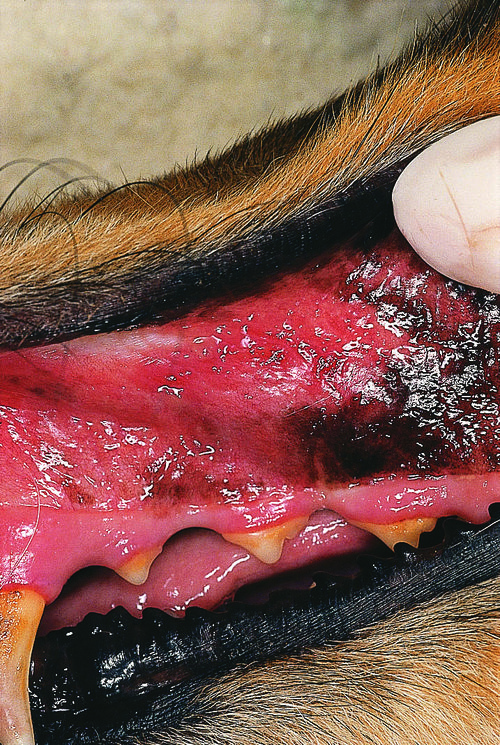Difference between revisions of "Veterinary Dentistry Q&A 17"
Ggaitskell (talk | contribs) |
|||
| (One intermediate revision by the same user not shown) | |||
| Line 1: | Line 1: | ||
| − | |||
| − | |||
| − | |||
[[File:Vet Dentistry 17.jpg|centre|500px]] | [[File:Vet Dentistry 17.jpg|centre|500px]] | ||
| Line 22: | Line 19: | ||
Uremia may be secondary to postrenal disorders or renal failure (acute or chronic) with chronic renal failure the most common cause of ‘uremic stomatitis’. | Uremia may be secondary to postrenal disorders or renal failure (acute or chronic) with chronic renal failure the most common cause of ‘uremic stomatitis’. | ||
| − | |l1= | + | |l1= |
|q2=What factors are responsible for the oral changes in this patient? | |q2=What factors are responsible for the oral changes in this patient? | ||
|a2= | |a2= | ||
| Line 28: | Line 25: | ||
*uremic vasculitis and thrombosis resulting in necrosis and sloughing of the rostral tongue; | *uremic vasculitis and thrombosis resulting in necrosis and sloughing of the rostral tongue; | ||
*alterations of the immune response secondary to uremia. | *alterations of the immune response secondary to uremia. | ||
| − | |l2= | + | |l2= |
|q3=What treatment would be beneficial for this patient? | |q3=What treatment would be beneficial for this patient? | ||
|a3= | |a3= | ||
| Line 38: | Line 35: | ||
Oral pain is a significant problem in some patients and the topical application of lidocaine gel or a sucralfate paste may help to alleviate the oral pain. | Oral pain is a significant problem in some patients and the topical application of lidocaine gel or a sucralfate paste may help to alleviate the oral pain. | ||
| − | |l3= | + | |l3= |
</FlashCard> | </FlashCard> | ||
Revision as of 06:19, 30 September 2011
This ten-year old, spayed female Collie has a serum urea nitrogen of 70.3 mmol l–1 (99 mg dl–1) and creatinine of 885 mmol l–1 (10 mg dl–1).
| Question | Answer | Article | |
| What is the diagnosis? | Uremic stomatitis. The uremic patient also has signs of systemic disease. Clinical signs associated with uremia may include depression, lethargy, halitosis (‘uremic breath’), loss of appetite, weight loss, vomiting, diarrhea, and oral ulceration. Diagnostic evaluation of the uremic patient will indicate significant elevation of the serum creatinine, urea nitrogen, and phosphorus. Uremia may be secondary to postrenal disorders or renal failure (acute or chronic) with chronic renal failure the most common cause of ‘uremic stomatitis’. |
[[|Link to Article]] | |
| What factors are responsible for the oral changes in this patient? |
|
[[|Link to Article]] | |
| What treatment would be beneficial for this patient? | Treatment of the primary renal or postrenal problem causing the uremia should be the major focus. Decreasing the blood urea nitrogen level will decrease the urea in saliva and gingival crevicular fluid available for ammonia production. Topical or systemic treatment to decrease oral urease-producing bacteria will decrease ammonia production. Oral pain is a significant problem in some patients and the topical application of lidocaine gel or a sucralfate paste may help to alleviate the oral pain. |
[[|Link to Article]] | |
